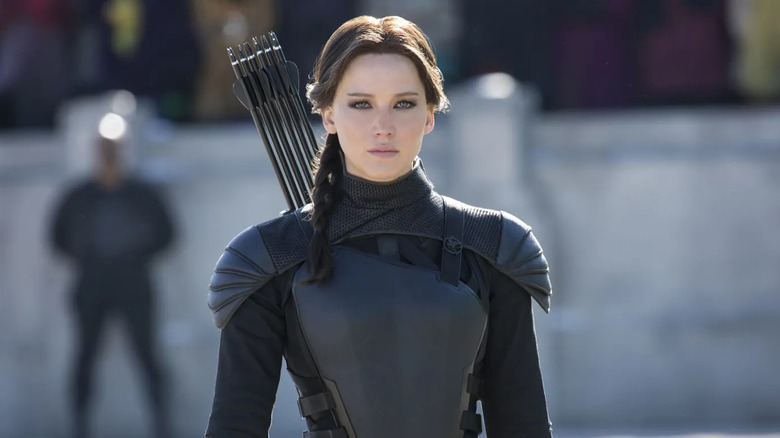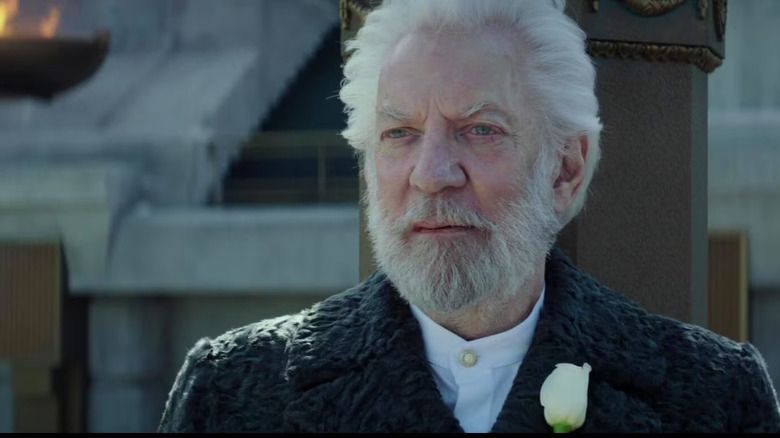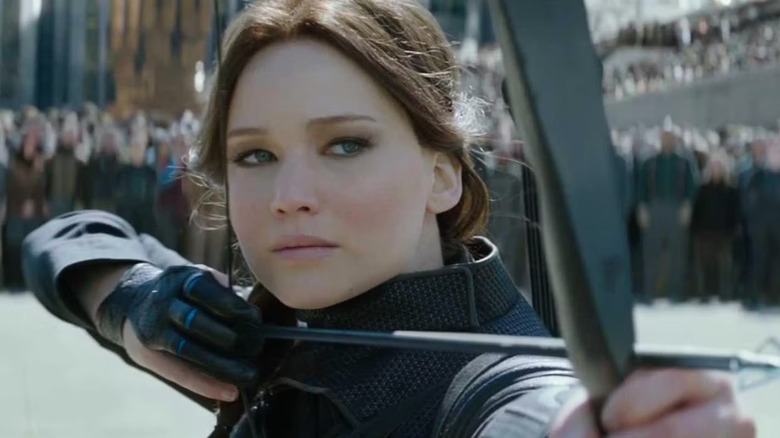Why Did Katniss Kill Coin In The Hunger Games Instead Of Snow?
Suzanne Collins' uber-popular novels "The Hunger Games," which were adapted into a film franchise of the same name that launched in 2012, present a pretty conflicting view of humanity; through the eyes of the series' protagonist Katniss Everdeen (Jennifer Lawrence on-screen), nobody is ever truly just "good" or "evil." This makes sense when you consider that, throughout Katniss' entire life, she's watched as children are systematically plucked from twelve districts in Panem (a dystopian version of North America) and forced to fight to the death for the pleasure of the powerful Capitol, ensuring that the districts stay in line after a rebellion years prior. So, at the end of the series — in the two-part film "Mockingjay," based on the book of the same name — why does Katniss choose to kill President Alma Coin (Julianne Moore), the woman who has, ostensibly, been leading the revolution Katniss wanted all along?
The answer is actually pretty complicated ... and it also ties directly to Katniss' complicated history with authority figures at large, including the corrupt President Coriolanus Snow (Donald Sutherland), the controller of the Capitol for decades who may or may not have murdered many of his own political opponents. Here's exactly why Katniss kills Coin, what she discovers about the woman who runs the mysterious (and well-hidden) District 13, and why Snow and Coin are equally horrifying villains.
Who is The Hunger Games' President Coin?
Let's back up a bit. As fans know, during the first "Hunger Games" film and book, Katniss volunteers as a tribute for District 12 to replace her younger sister Primrose Everdeen (Willow Shields), pairing her with Peeta Mellark (Josh Hutcherson) as the district's male tribute. After the duo sell an impressively convincing story to the districts and the Capitol — namely, that they're in love and can't bear the thought of killing each other in the Games — the Capitol is forced to allow them both to win, but as Peeta and Katniss' mentor Haymitch Abernathy (Woody Harrelson) quietly reveals to Katniss, President Snow is furious over the fact that a young girl was able to humiliate him so expediently. In the second installment, "Catching Fire," Snow retaliates by sending only previous victors back into the arena ... and because District 12 only has three known surviving victors (and the aging, alcoholic Haymitch is one of them), Peeta and Katniss head back into the arena.
Though they form some interesting alliances in the games with previous victors, Peeta and Katniss still stick together ... until the bitter end, when Katniss is reminded of the "real enemy" and fires an arrow at the force field surrounding the arena. The arena breaks down and Katniss is rescued from the rubble along with a few fellow tributes, but Peeta is captured by the Capitol, leaving Katniss alone in District 13 with her new "ally," President Coin.
To say Coin isn't thrilled about Katniss' attitude and lack of camera-ready instincts is an understatement (she actually grouses, quite a bit, about the fact that she could have ended up with the charming, captivating Peeta instead). Still, the two work together as well as they can until Coin overplays her hand, killing someone Katniss loves.
Who is The Hunger Games' worse villain: Coin or Snow?
To be perfectly clear, President Snow is a bad guy. He oversees child murder as a spectacle for literal decades, and the only reason he gets closely involved with the 74th Hunger Games — Katniss' first go-around — is because he senses that Katniss might not be as cooperative as he'd hoped. (This instinct is further explored in the prequel "The Ballad of Songbirds and Snakes," which shows a young Coriolanus Snow, played by Tom Blyth, entranced and betrayed by another rebellious District 12 tribute: Lucy Gray Baird, played by Rachel Zegler.) When Snow is captured by Coin after the rebels successfully attack and overtake the Capitol, though, he tells Katniss a secret — and she knows he's telling the truth, because he has nothing left to lose.
Here's what President Snow tells Katniss: before his capture, aircrafts that appeated to come from the Capitol itself attacked a group of children, forcing medics to come and help. Katniss already knows about this part — her sister Prim, whose life Katniss would protect with her own, was working as a medic and killed by a second bomb that arrived in the form of false aid (disguised as medical parachutes containing supplies). Snow tells Katniss that the Capitol didn't send the second bomb; the rebels did, on Coin's orders. When Katniss interrogates her best friend Gale Hawthorne (Liam Hemsworth), who worked closely with Coin on the rebel camp's military strategy, he confirms that Snow is telling the truth, but she should have known anyway ... because early in the series, Snow and Katniss agree not to lie to one another. Coin, unaware of Katniss' recent discovery, tasks "the Mockingjay" — or the symbol of the resistance — with executing Snow in public. Here's what she does instead.
Why did Katniss kill President Alma Coin instead of President Coriolanus Snow?
While President Coin gives her victory speech to the rebels and Capitol citizens alike, telling them they're finally free from President Snow's tyranny, Katniss waits patiently in the wings as she prepares to — presumably — execute President Snow using her bow and arrow in front of an enormous crowd. What Katniss does instead is aim for Snow and, at the last minute, send an arrow directly into Coin's heart, killing her; Snow laughs in his final moments before he's killed by the furious, baffled crowd. Katniss tries to swallow a pill similar to a cyanide tablet in her pocket, which would end her life, but Peeta stops her just in time, and she's arrested for Coin's murder.
In the film series, Katniss is simply pardoned, and in Suzanne Collins' book, she's acquitted of the murder by reason of insanity. Either way, here's why Katniss kills Coin at the end of "The Hunger Games: Mockingjay — Part 2." She knows that, given the chance, Coin would seize power just as Snow did before her and subjugate some portion of Panem. (In fact, Coin was planning to launch a "new" Hunger Games composed entirely of Capitol children, an idea met with strenous objections from Katniss and fellow surviviors of the Games.) In killing Coin, Katniss ensured that tyranny in Panem could actually end, rather than continue on with a new leader falsely promising change and hope.
Both parts of "The Hunger Games: Mockingjay" are streaming on Starz now.



